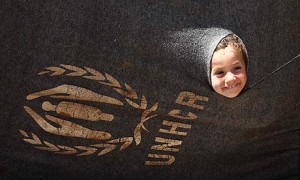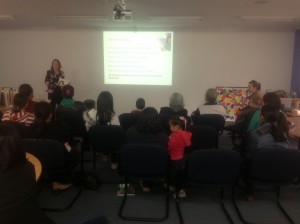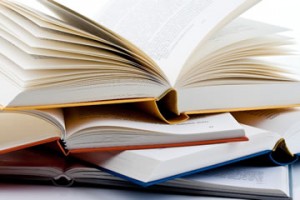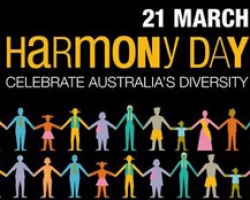If you’re considering teaching your children more than one language at home, it helps to be able to sort the myths from the facts.
For example …
Dad is at the sink washing dishes when he feels a tug on his pants:
- ‘Daddy? Can I have some biscuits?’
- ‘I don’t know, Alex. Go ask your mum, I think she brought home something special for dessert tonight.’
Running over to the dining room, Alex meets her mum clearing the last of the dinner plates off the table:
- ‘Mami … papi dice que puedo comer una galleta porque me acabé toda la cena.’
- ‘Mijo, pero compré fresas para el postre. Mañana puedes comer una galleta.’
- ‘Pero mami no me gustan las fresas. Quiero una galleta … por favor.’
You don’t need to speak Spanish to understand that what’s going on here is more than a request for a biscuit. Alex is one of a growing number of children whose home is a real-world classroom for learning to speak, read and write more than one language.
A question of language
In the cities and suburbs around the country, the sounds of Vietnamese, Arabic, Cantonese and many other languages are becoming more and more common. More and more multilingual families in Australia are facing a tough question – should my child learn more than one language, or only English?
In the example above, the answer is simple – Alex would learn both. Although her parents are fluent in both languages, dad is more comfortable with English and he uses it most of the time. For mum, Spanish is the language of her family, her culture and her heritage, a connection that she wants to pass on to her daughter.
In this country, there are lots of different views about the increasing numbers of bilingual children. A closer look at research suggests that teaching children more than one language at home has its own set of challenges and rewards.
Learning two languages
There are many reasons to teach children multiple languages when they’re young:
- Young children can pick up a new language faster and more easily than a teenager or an adult, although some experts suggest this difference can be attributed to the level of exposure rather than the age of the child.
- A second language is a skill that allows a child to explore other cultures and communicate with more people – at home and abroad.
- The ability to speak more than one language can create broader opportunities for employment in the future.
But as the number of bilingual children has grown in Australia, so have the myths about how learning two languages affects children. Have you ever heard that bilingual children are more prone to language disorders, such as using the wrong word? Or that bilingual children have trouble communicating in both languages? Do bilingual kids struggle more with reading and writing?
Facts about bilingual children
Research clearly shows that bilingualism doesn’t cause language disorders. From time to time, children might use a word from one language while speaking in another. But these moments of ‘language switching’ disappear after a few years, usually by age five.
- Children can master more than one language at a time – it might just take a little longer. Learning one language is a big challenge for everyone. Learning a second set of words and grammar takes even more effort. It all boils down to exposure and practice. The more children hear and use a language, the faster they’ll learn it.
- Exposure to more than one language at an early age doesn’t make it harder to read and write later. In fact, there’s some evidence that shows the opposite is true – that learning to read in one language helps a child learn to read in another.
There’s another benefit to teaching children to speak more than one language at an early age. Some studies suggest that bilingualism might help children develop certain attention skills sooner. ‘Selective attention’ is the ability to focus on important details while ignoring distracting and misleading information. It’s something bilingual children do a lot as they learn to filter out words from one language when speaking in another.
Overcoming challenges of learning two languages
As already mentioned, learning two languages requires more practice than learning one. And that leads to some potential challenges for children in bilingual households.
The first is that it might take more time to develop a large vocabulary in each of the languages. Studies have shown that bilingual children tend to have somewhat smaller vocabularies in each language than classmates who speak only one language. But the reason is simple – they need to learn new words in both languages, instead of just one. That doesn’t mean they know fewer words.
Some studies suggest that bilingual children actually have a larger overall vocabulary if you count the words they know in both languages. Over time, bilingual children catch up to their single-language peers, and most differences disappear by grade five.
The second challenge is that bilingual children may trail English-only classmates when it comes to specific language tests, at least in the early grades. One research study of nearly 1000 bilingual children showed that they tended to score lower on some oral language tests. But language tests aren’t the whole picture – when it came to talking to others and understanding them, bilingual children did well in both languages. And, as with vocabulary, the differences that showed up on the language tests tended to disappear in later grades.
Deciding whether to teach two languages
For any family facing the question of teaching their children more than one language, the answer is simple – do what feels right to you.
There’s growing agreement among researchers that learning two or more languages – while adding some specific challenges – doesn’t hurt a child’s development. In fact, it might help develop important mental skills and open up a world of opportunities later in life.
Language is more than a way to communicate – it’s a living expression of culture, community and family ties. And for a growing number of homes, that’s reason enough to fill a house with the sounds of more than one language.
Helpful tips
Are you wondering how to help your child learn two languages? Here are some ideas to keep in mind.
- Give your child plenty of practice in both languages. Children need to hear and speak each language often to learn the words and grammar of both.
- Children learn languages best from you. CDs and DVDs don’t work as well as a real person using language in everyday situations such as playing, shopping or just talking.
- Read to your children in both languages – it’s a great way to build vocabulary and early reading skills.
- Don’t be surprised if one language becomes stronger than the other. It’s common for one to become dominant, and it’s usually the one the child hears and uses most.
- Use language the same way with all of your children. Language and emotions are linked, so using English with one child and Mandarin with another could lead to hurt feelings.
- Have patience with mistakes or language switching. This is a normal part of learning two languages (and might even show a special skill). With more practice, these mistakes will fade.
Some language facts
- According to the Australian Bureau of Statistics, in 2011, 20% of second generation migrants (children of migrants) spoke a language other than English at home.
- The most common languages other than English are Mandarin, Italian, Arabic and Greek.
- Collectively, Chinese languages (including Cantonese, Mandarin and others) have the greatest number of speakers after English.
- The three most commonly spoken indigenous languages are Kriol (an Australian Creole) and two Central Australian languages – Pitjantjatjara and Warlpiri.
Source: http://raisingchildren.net.au/articles/two_languages_spoken_here.html









